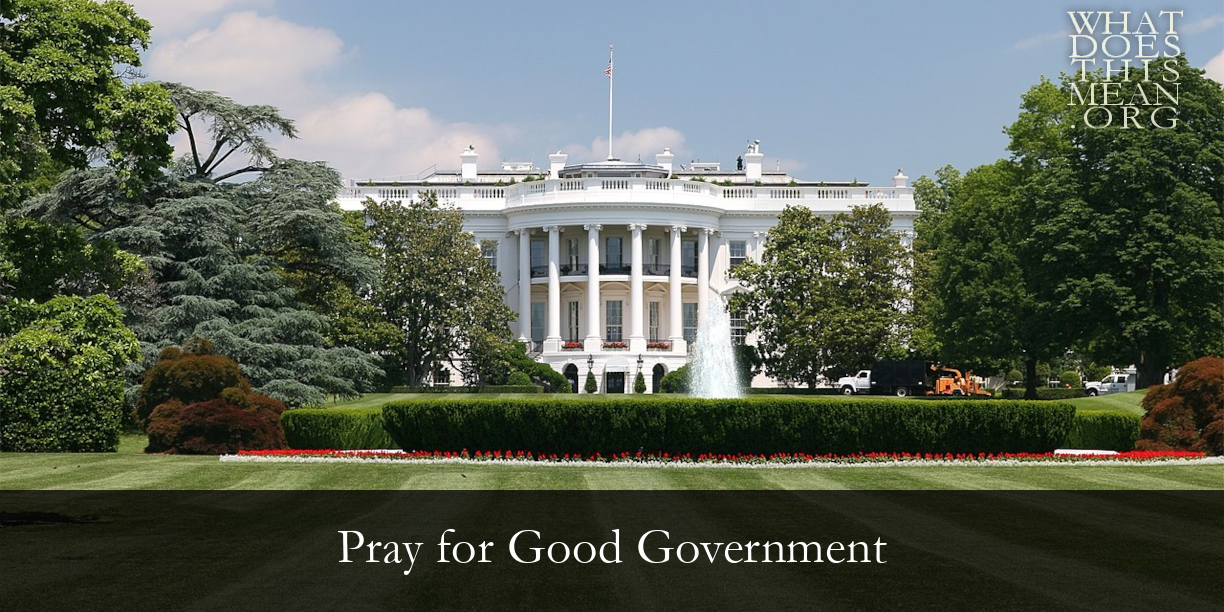No matter the government, weather it be good or evil, St. Paul’s divinely inspired instructions are clear:
“I urge that supplications, prayers, intercessions, and thanksgivings be made for all people, for kings and all who are in high positions, that we may lead a peaceful and quiet life, godly and dignified in every way” (1 Timothy 2:1-2).
What kind of help and blessing do we pray from the Lord for these persons of high position? We pray that they fulfill their God given calling. In the case of government, it’s that they curb destructive wickedness that wrecks human society (Romans 13:4). We pray they promote the common good by recognizing and supporting the centrality of the family and our spiritual life in the church. If they won’t support the church because they don’t want to distinguish the true from false confessions, then at least we pray they grant us the freedom to live according to conscience that’s been molded and shaped by God’s Word. We pray for the freedom to worship as God has commanded. If they are doing so already, we pray they remain steadfast. If they are not, we pray for their repentance.
If a government is hostile toward the Gospel and the Christian life of love, the Scriptures give us examples of what our prayers should sound like. Christian prayer always springs from divinely revealed realities. Take the 82nd Psalm, for instance. The Holy Spirit through Asaph shows the reality of the Lord standing in judgment “in the midst of the gods.” They may not know it now, but the Lord sees their actions and holds them accountable. The Lord speaks to them, “How long will you judge unjustly and show partiality to the wicked? Give justice to the weak and fatherless; maintain the right of the afflicted and the destitute. Rescue the weak and the needy; deliver them from the hand of the wicked” (Ps 82:2–4). The psalmist notes, with sadness it seems, that the “gods” of this earth do not heed the Lord’s instruction. “They have neither knowledge nor understanding, they walk about in darkness; all the foundations of the earth are shaken.” The psalmist says they strut around like their power is their own instead of on loan from the Lord. Their corruption shakes the godly foundations of this life, and they’re pleased because it serves their selfish wants. The Lord speaks again, “I said, 'you are gods, sons of the Most High, all of you; nevertheless, like men you shall die, and fall like any prince'” (Ps 82:6-7). This is the comfort of the Holy Spirit’s revelation. Though these men or women assume godlike power to shape and bend creation to their whims, they and their plans will wither and die like all flesh under God’s judgment against this world’s sin. And now the psalmist leads the congregation in prayer, “Arise, O God, judge the earth; for you shall inherit all the nations” (Ps 82:8).
God help the government against whom the saints pray judgement!
Instead of praying for absolute destruction, we leave the work of judgment to the Lord and petition him always for his mercy, especially for our enemies. This is what St. Paul means when he tells the saints to “bless those who persecute you; bless and do not curse them” (Romans 12:14). The old Lutherans, in this vein, used to pray the Lord would curb the attacks of those in power, defend the Christians faith and bodies from harm, and turn the hearts of their persecutors. A good example comes from Luther himself who prays the Fourth Commandment:
“Here we should also add a prayer for parents and rulers, that God would give them understanding and wisdom so that they may lead and govern us in peace and blessedness. May he protect them from tyranny, madness, and furry, and turn them from such things so that they honor God’s Word and not persecute it or do anything unjust. For such high gifts one must obtain with prayer, as St. Paul teaches, otherwise the devil will rule the palace and everything will go badly and be laid waste.”*
These things are necessary to write now because a narrative is being weaved by the main stream media that draws a direct line of complicity between the rioters who stormed the capitol earlier this month and evangelical Christians who have said that God sent Trump to be our president. No doubt some “evangelical” teachers spoke untruths about God’s plan and purpose for Trump, but we shouldn’t deny the truth that the Lord gave us our leader for the past four years. Just as he gives us Joe Biden for the next four years.
No matter our political leanings and outside pressures to deny God’s hand at work in this world, we should confess boldly to the world that just as we refused to trust in Trump for salvation in this world or the world to come, so we will not trust in Biden to offer anything better. We do pray for them. We do pray that the Lord grants Biden a spirit of wisdom to fulfill his calling. We pray that instead of repressing the church and a biblical worldview, that he would protect and defend it. We pray that God’s will be done through him.
* Martin Luther, A Simple Way to Pray, translated by Matthew C. Harrison, (Saint Louis: Concordia Publishing House, 2012), 21.



 RSS Feed
RSS Feed
